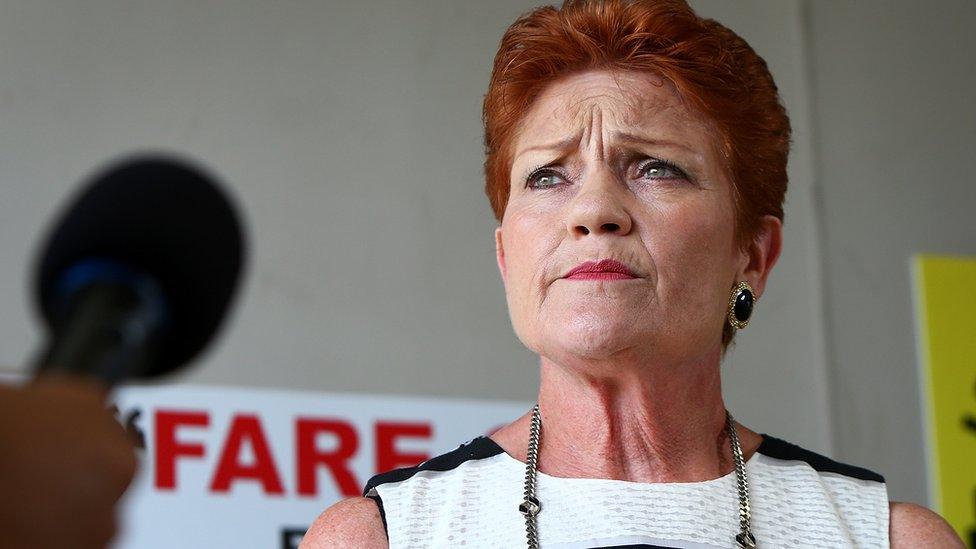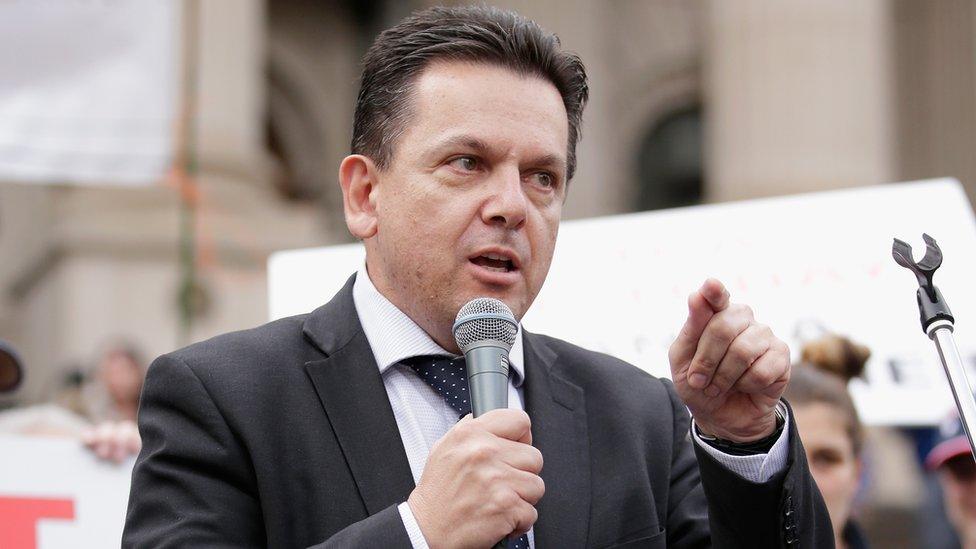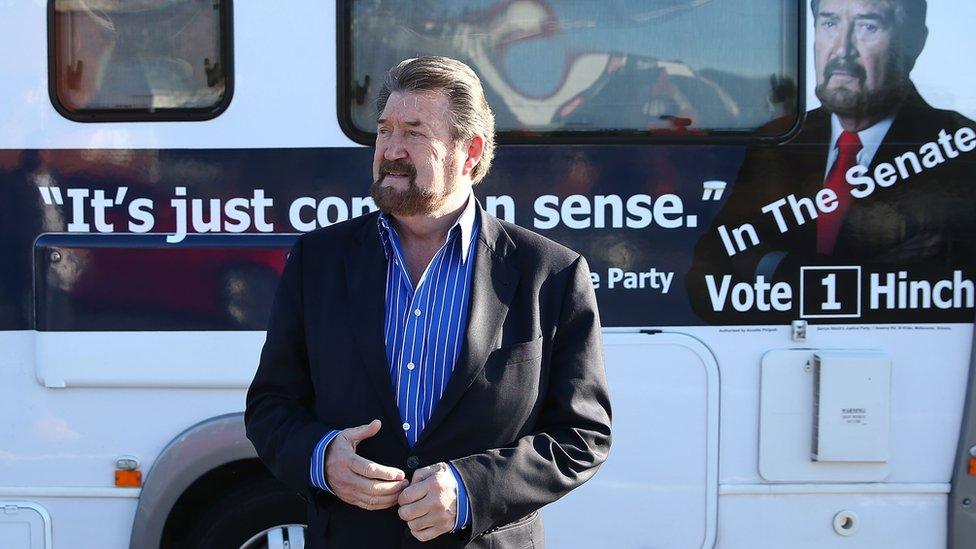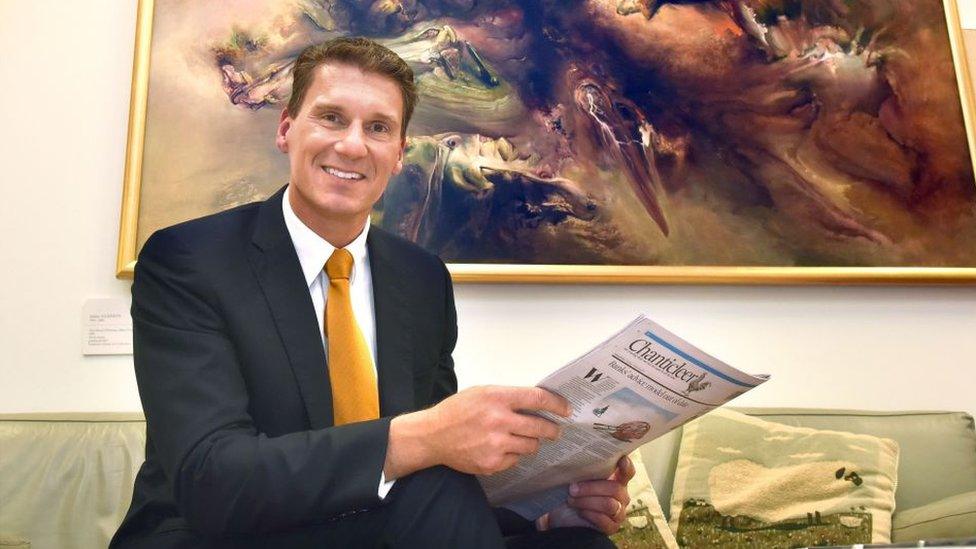The rise of populist politics in Australia
- Published

Far-right leader Pauline Hanson has set her sights on upcoming elections
Once reviled for her views on Asian immigration and Aboriginal welfare, Pauline Hanson is being courted by mainstream politicians as the populist wave reshaping the world's liberal democracies laps at Australian shores.
Ms Hanson's One Nation is the biggest beneficiary of growing disenchantment with traditional politics in Australia, where Donald Trump's US election victory and Britain's Brexit vote have energised minor parties with right-wing populist agendas.
However, while One Nation is riding high - with four seats in the federal Senate, a deal with the governing Liberal Party in Western Australia, and forecasts it could win nearly one-quarter of votes in a Queensland state election - the former fish-and-chip shop owner is not the only contender for the title of Antipodean Trump.
Last year's general election saw a surge in support for independents and minor parties, thanks partly to charismatic individuals such as Nick Xenophon, whose protectionist Nick Xenophon Team won two seats in the lower House of Representatives.

You might also be interested in:

And, last month, Malcolm Turnbull's governing conservative Liberal-National Party coalition was shaken by the departure of an outspoken right-wing politician, Cory Bernardi, who - accusing the Liberals of abandoning their traditional values - announced the formation of his own, ideologically purer party.
Indeed, what is is distinctive about Australian populism is the emergence not of one key figure - a Farage or Le Pen or Trump - but of a diverse field of parties and personalities, says Dr Nick Economou, a political scientist at Melbourne's Monash University.

Publicity-savvy Nick Xenophon has significant support in South Australia
Dozens of small right-wing parties stood at the 2016 election, winning only a tiny fraction of the vote. The exception was One Nation, which - after storming on to the political stage in the mid-1990s, then fizzling out amid in-fighting and fraud allegations - staged a triumphant renaissance.
Now mainstream politicians, particularly from the coalition, are lining up to praise the party as "a very different beast to what it was 20 years ago... a lot more sophisticated" (Arthur Sinodinos, a federal cabinet minister), and its leader as a "much more mature politician... responsible... helpful" (former Prime Minister Tony Abbott).
The reason? Along with other minor players, including the well-established Australian Greens, One Nation holds the balance of power in the Senate, meaning the government has to negotiate with it to get legislation passed.
That gives Ms Hanson - who toasted Mr Trump's victory with champagne, and declared that "I can see in Donald Trump a lot of me" - a degree of influence unprecedented for a far-right politician in Australia.
Controversial deal
In Western Australia, meanwhile, where polls suggest One Nation could win up to 13% of the vote in a state election next week, the ailing Liberal Party has done something which less than a year ago would have been unthinkable.
It has struck a deal with One Nation which, under Australia's preferential voting system, could help the Liberals hold on to government, while handing the former pariahs the balance of power in the state's upper house.
And in Queensland, Ms Hanson's home state, where an election is due in the next year, polling indicates her party could top the 22% of the vote it won in 1998.

Former radio shock jock Derryn Hinch won a Victorian Senate seat last year
Then, One Nation's rise was seen as a blip. Now, with populist currents sweeping much of the Western world, the party is being feted by conservative commentators. Ms Hanson has even floated the idea that she could one day become prime minister.
"This time Hanson is no passing phenomenon," commentator Paul Kelly wrote in The Australian. "She is a far more formidable prospect than 20 years ago, and enjoys an anti-politician cultural status."
At the federal election, minor parties won a record 34% of the Senate vote, thanks to factors now familiar to pundits in Britain and the US - growing income inequality, nationalism, anti-immigration and anti-free trade sentiment, and backlashes against "political correctness" and globalisation.
In recent times, economic growth has slowed in Australia, while wages have stagnated. Traditional industries such as car-making have shut down, and manufacturing has moved offshore. Job insecurity is rife.
"Anti-government feeling and dissatisfaction with the political establishment are benefiting parties with very simple slogans and approaches to complex issues," Norman Abjorensen, a visiting fellow in policy and governance at the Australian National University, told the BBC.
States favour different leaders
Like its counterparts elsewhere, One Nation draws much of its support from disadvantaged regional areas and people living on the urban fringe. In several Australian states, though, it faces stiff competition.
Mr Xenophon, seen as a "Mr Clean" politician and a champion of ordinary citizens, has captured the anti-establishment vote in South Australia; Jacqui Lambie, a plain-spoken independent, is the choice of disaffected Tasmanians. Victorians elected Derryn Hinch, a former shock jock, to the federal Senate.
As for Mr Bernardi, few believe his Australian Conservatives party will draw significant support. His departure, though, may force Mr Turnbull to go to greater lengths to placate right-wingers in his Liberal Party, lest they feel tempted to jump ship too.

Conservative politician Cory Bernardi recently broke from the ruling coalition
Forced to resign as Mr Abbott's parliamentary secretary in 2012 after suggesting same-sex marriage could lead to bestiality, external, Mr Bernardi has denounced Islam as a "totalitarian political and religious ideology", asylum seekers as "welfare squatters" and abortion advocates as "pro-death".
Cool heads note that, despite the hype, One Nation won only 4.3% of votes in the federal Senate, and 1.8% in the House of Representatives.
One important difference between Australia and the US, says Dr Economou, is that Mr Trump "mobilised and impacted on one of the major parties", while in Australia the likes of One Nation remain outside the political mainstream - not least because the voting system in the key House of Representatives is majoritarian.
"That system is designed to make it very difficult for minor parties to win a seat," Dr Economou told the BBC. "And Australian politics is amazingly pragmatic. We do not like ideologues, we never have and never will."
How influence could play out
Nevertheless, One Nation and other smaller players can shake things up, and they are certainly unnerving the major parties, which are scrambling to minimise inroads into their support and even parroting populist rhetoric.
Sections of the opposition Australian Labor Party are pushing for the country's highest earners to pay a minimum rate of tax, while Labor's leader, Bill Shorten, has pledged to "buy Australian, build Australian, make in Australia and employ Australians ... We will not leave people behind."
The One Nation Party's Pauline Hanson will be a powerful force in the Australian Senate.
Dr Abjorensen calls One Nation "a force to be reckoned with, one that the major parties are going to have to deal with. We're obviously going to see concessions made to the right-wing agenda that probably wouldn't have seen the light of day in previous eras".
Deals such as the one struck in Western Australia, he adds, "will lend further legitimacy to Pauline Hanson and strengthen her power base".
Ms Hanson won a seat in the federal parliament in 1996. In her maiden speech, she claimed Australia was "in danger of being swamped by Asians". In her maiden speech last year, following her return to Canberra, she claimed Australia was "in danger of being swamped by Muslims".
As one commentator has written of One Nation: "Nothing has changed... What has changed is the sea they swim in."